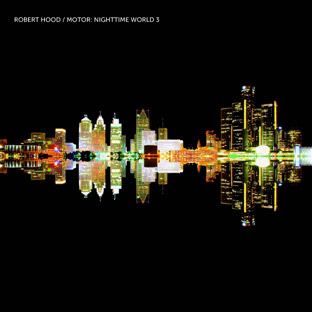In recent decades Detroit has become synonymous with urban rot, a deserted ghost ship metropolis being reclaimed by nature. Director Julien Temple made an excellent documentary for the BBC a couple of years ago, Requiem for Detroit, that showed in visceral terms the devastating effect that mass urban flight and loss of heavy industry has had on the city. Vast factories, too expensive to demolish, lay surrounded by scrub; whole neighbourhoods barren; mass arson on ‘devil’s night’; barricaded pawn shops; block after block of dereliction and decay; haunted Americana on a vast scale. Watching it felt like being privy to the inner cogs of some sinister pre-determined end game.
The psychogeographical background to Robert Hood’s new album is decline and regeneration in Detroit – and musically he rises to such grandiose themes. Motor: Nighttime World 3 is the most fully realised LP of his career, a truly epic journey that flows with beautiful poise. Track titles like ‘The Exodos’, ‘Slow Motion Katrina’, ‘Drive (The Age Of Automation)’ and ‘Assembly’ speak for themselves. Hood has put together here a triumphant and moving piece of motor city techno soul, boasting otherworldly production values that will have you shaking your head with wonder at its beautifully rendered intricacies.
Thematically, however, Hood is no stranger to high concept. His seminal 1994 debut album Minimal Nation stripped Detroit techno of its most classically ‘musical’ signifiers – strings and melodic complexity – leaving only bare bones percussion, and in the process pioneered the art of the clear and perfect loop (alongside sleeve notes discussing the nature of minimalism in art and religion). Last year’s Omega LP was based around obscure 1970s sci fi movie The Omega Man, his trademark pummelling minimalist techno grooves carrying the apocalyptic concept without much let up of pace or texture.
But while he has been vocal about these concepts, the music itself has often been utilitarian to the point of starkness. Perfect tools that leave ample room for creativity on behalf of the DJ, offering minimal variation in tempo or progression, they have also left space to dwell on the overriding theme – the techno equivalent of a Zen rock garden.
However, Motor works with a staggeringly diverse palette of sound that puts paid to any preconceptions that Hood is all about repetitious power grooves. It’s the combination of heart wrenching soul and microscopic detail that makes this album so special. Thus we have broken beats in combination with dubby reverb (‘Better Life’, ‘The Exodos’); lush melodic orchestral passages (‘Learning’) and dark acidic squelch (‘Hate Transmissions’). Ballsy techno gets a serious workout in the form of ‘Drive (The Age Of Automation)’ while ‘Slow Motion Katrina’ is as close to jazz as a Hood production has ever got. But the detail, good god, the detail!
Just listen to the progression of ‘The Wheel’. Truly miraculous sound design; implausibly perfect. Hissing hats rising and swelling against each other like gases bubbling from the seabed, whispered suggestion of a melody in the form of brittle lounge keyboard. The acoustic potential of the assembly line is almost a cliché in electronic music, but listen to ‘Black Technician’ – he conjures the melancholy, the drive, the boredom, the ghosts of the machine. And how does he make pounding techno sound weightless?
This is the sound of a producer at the very pinnacle of his creativity. Unhindered by notions of functionality and genre, Robert Hood has delivered his masterpiece – the sound of Detroit. More than that, the sound of a man coming home.


